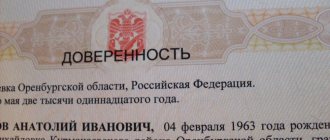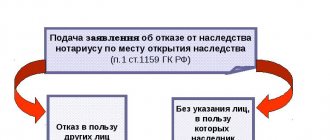What is a general power of attorney?
This is a document of a certain sample, certified by a notary, which gives one person (individual or legal entity) legal grounds to perform various actions specified in the document on behalf of another person. Most power of attorneys have a validity period (maximum - 3 years), but there are also unlimited ones, which are rare, and notaries are reluctant to certify them. Only legally capable citizens can enter into such an agreement.
To whom is it issued?
A power of attorney can be issued to any individual with legal capacity or legal entity; current legislation does not put forward any restrictions on this issue. The presence of the authorized person during the transaction is not mandatory; he can even be abroad and receive the paper by regular mail (by certified registered mail) or through a friend.
What is it for?
The rights specified in the “general” vary and can authorize the authorized person to take the following actions:
- drive a vehicle, manage property;
- carry out banking operations (receiving deposits, loans, manipulating accounts);
- be a representative of the principal's interests in government bodies or other organizations;
- sign on contracts and other papers.
Varieties
Depending on the type of person, you can issue a power of attorney for:
- Legal.
- Individual.
The service can be:
- Urgent.
- Ordinary.
The work can be performed locally:
- At home.
- At the agency office.
The power of attorney can be issued:
- For husband, wife.
- For children.
- To the parents.
- For brothers and sisters.
- For an employee at work.
- On other persons.
According to the performer, the work can be performed:
- A notary who does not belong to any company works for himself.
- Specialist of a private notary office.
- Specialist of a government agency.
A power of attorney can be prepared:
- For one person.
- For several representatives.
Rights and obligations of the principal
There are two parties to a general power of attorney – the principal and the attorney. Everyone has their own rights and responsibilities. For the trustee they are:
- is obliged to provide the authorized person with rights (powers), indicate them, and notarize the paper;
- is obliged to provide the authorized person with the funds necessary to carry out instructions and to compensate for the material damage incurred;
- is obliged to accept all obligations fulfilled under the contract and to remunerate if this was stipulated in the conditions;
- has the right to terminate the deal at any time.
Types of powers of attorney for individuals
Based on the characteristics of the agreement, content and amount of powers, powers of attorney are divided into three main types:
- One-time. It gives the authorized person the right to perform a certain action once. For example, to receive monetary values (salary, pension) when the principal cannot do this on his own.
- Special. With such a document, the attorney is authorized to perform the same action several times.
- General (general). Gives the trustee the opportunity to legally dispose of, manage the trustee’s property, and perform various manipulations with it.
For all powers
This type of contract provides the attorney with absolutely all the opportunities available to the principal. The authorized person can:
- act on behalf of the person who issued the document in all instances, without restrictions on forms of ownership;
- resolve issues, sign documents with any individuals;
- manage the tangible and intangible property of the first person (receive salaries, pensions, transfers, enter into a will, read letters and respond to them);
- act on behalf of the principal in any area of activity.
Are you interested in how to issue a general power of attorney for everything? To begin, select a trusted person, prepare his passport details, other documents (for property rights, registration certificate for a car), make several copies of all papers. Next, contact a lawyer who will provide you with a general power of attorney form for all powers, formalize the transaction in accordance with all requirements and certify copies. After carefully reading the text of the general power of attorney, all that remains is to sign and give it to the authorized person.
For car
This type of power of attorney is the most common; the subject of delegation under such an agreement is the following powers:
- exchange, sale, disposal of vehicles;
- deregistration with state traffic inspectorates;
- transfer of the vehicle to a third party;
- other actions at the disposal of the vehicle.
When issuing a “general registration” for a car, the seller must take into account the fact that until the buyer changes the documents in his name, tax receipts and fines will come in his name. The most unpleasant moment is that the authorized person may get into an accident (with casualties, damage) and flee the scene. Then the police will come to the seller to sort it out.
A buyer who does not re-register a car after signing a general contract also risks it. The seller can revoke the document at any time and take the vehicle; in the event of his death, the right to own the car will be inherited by the heirs. If the buyer dies, the contract becomes invalid and the vehicle returns to the seller.
For real estate
The general agreement for real estate gives the attorney the following rights:
- prepare and execute any documentation on behalf of the principal (lease agreement, donation agreement, purchase and sale agreement, exchange agreement);
- resolve all bureaucratic issues and organizational problems;
- personally participate in transactions and sign.
Often such a notarial document is issued for a specific property with an address, a clear description of the apartment, house, and information about state registration. It is also necessary to draw up a list of all powers over real estate transferred to the attorney, thereby outlining the legal framework within which he can act. An important nuance is that it is impossible to register someone in an apartment using a “general” license.
To represent the interests of a legal entity
The general agreement, under which a legal entity represents an individual before others, must be executed in writing. It is necessary to have the signature and seal of the head of the company, the signature of an authorized person, and the date of signing the document. All information in this legal paper can be presented in a business style, without errors, blots, or corrections.
Registration of a general power of attorney from a notary
In most situations, the rights and powers listed in such an agreement require certification by a notary office. The document must have the signature and seal of a notary, so you will still have to visit it. When drawing up such papers, the lawyer must explain to the parties to the transaction the possible consequences after the conclusion. One copy of the agreement is given to the authorized person, the second remains in the notary's office.
The principal must be present at the transaction in person, have the originals of all necessary documents with him, draw up a list of powers, and put his signature. Most “generals” do not require the presence of an authorized person; passport data is enough to draw up an agreement. He will be able to receive his copy of the document after the transaction is completed.
What documents are needed for registration?
To go to a notary to obtain a general power of attorney, you must bring the originals of the following documents:
- passport of the Russian citizen of the principal + photocopy;
- principal identification code;
- property ownership documents + photocopy;
- passport information about the authorized person, it is better to provide a photocopy of his passport;
- in case of sub-authorization - the main power of attorney.
- Herbs for hypertension - folk recipes. Treatment of high blood pressure with herbs and diuretics
- What are calcifications in the right and left lungs, why are they dangerous?
- Korean cucumbers for the winter
conclusions
Buying an apartment by proxy is a risk. But if it is justified by the low cost of the apartment and its legal purity, the deal can be concluded. It’s easier to do it not with a realtor, but with a lawyer. He understands the consequences of transactions with a power of attorney and is responsible for his services.
The main thing you must do before the transaction is to make sure that the owner exists, is alive and sane. Talk to him in any instant messenger with video calling. Request a certificate from the PND. Don't forget to confirm the power of attorney status and check the notary's license. If you are settling with a trustee, include in the contract a clause on the transfer of a notarized receipt stating that the owner has no objections to the transaction and settlements.
We received the title deeds after 3.5 months of waiting. First, Rosreestr lost our power of attorney, then an MFC employee made a mistake in filling out the application. Because of this, the state registrar suspended the transaction and returned the documents. It is noteworthy that the MFC employee filled out the application incorrectly, as she had no experience with transactions by proxy. I went to our registrar, and she showed with her fingers (and a package of documents) that the paperwork should be different. There is no way to influence this; we can only hope for the competence of the staff.
The story in the article is personal experience, not a guide to action. If you still decide to buy an apartment by proxy, consult a lawyer. He will explain the consequences of the transaction and check the documents.
Effect of general power of attorney
The “General” is valid for the period for which it is concluded, but can be terminated prematurely in the following cases:
- cancellation of paper by the principal;
- termination of existence of a legal entity (being an attorney or principal);
- refusal of the attorney from the obligations assigned to him;
- death of a trustee;
- death of the principal;
- recognition of the incapacity of one of the parties;
- restriction of legal capacity of one of the parties to the transaction.
For how long is it issued?
The validity period of the “general agreement” begins on the day of its signing. Most documents include this clause, but if it is not there, then the paper is valid for 12 months. The maximum possible period for issuing general powers of attorney is up to three years. If desired, the principal can terminate the contract before the expiration date. Also, the agreement becomes invalid in the event of the death of one of the participants in the notarial transaction.
Is it possible to revoke
The person who issued the power of attorney has every right to revoke it unilaterally. To do this, you need to write an application indicating the series, number, date of issue, and validity period of the document being revoked. It is not necessary to write the reason for the review. Next, you need to contact the lawyer who certified the paper; if that doesn’t work, another notary office will do. Upon completion of the revocation procedure, the notary is obliged to inform the trustee and other participants in the transaction about the termination of the agreement.
If the lawyer cannot do this within the time frame you need, notify everyone yourself. Your actions with the property will be illegal and may be challenged in court if the authorized person is not informed of the termination of the contract. It is possible to avoid the emergence of controversial issues by taking a receipt from the parties to the transaction stating that everyone has been notified and no longer has the rights and powers that were assigned to them by the document.
How to minimize common risks
1. Check the power of attorney and notary
Make sure that the seller's notary exists and has issued a power of attorney. You can find out the specialist’s license number, work schedule, phone number and email on the website of the Federal Notary Chamber.
Contact the notary in any convenient way and request information about the fact of issue. The specialist may refuse to reveal the “secret”, citing the confidentiality of personal data. But, according to our notary, more often he and his colleagues understand the importance of the situation and tell buyers the required minimum information.
Another nuance: the power of attorney was issued to my husband’s aunt by a person who temporarily acted as a notary. It was not possible to get it on the website. The lawyer explained: it is the notary who needs to be checked - the one for whom the assistant performed the duties.
The search result will be the current license number, work schedule and telephone number of the specialist.
2. Check if the power of attorney is valid
To do this, use the power of attorney verification service. Enter the document number, date of issue and full name of the notary. If nothing is found, the document is valid.
When registering a right, the state registrar checks the authenticity in the same service. It is impossible to determine a fake by the appearance of the form: scammers forge papers with skill.
At the time of verification, the power of attorney has not been revoked.
3. Meet the owner in advance
Explore his social networks to get to know him by sight. When submitting documents, keep a video call with him. During the conversation, record the screen: the owner should hold in his hands an open passport and a sheet of paper with the written date of the conversation. This will confirm that at the time of the transaction the seller is alive, which means the power of attorney is valid. A normal seller will not refuse such a small amount.
If the owner cannot get in touch (for example, he is too old), communicate with his relatives. Contact them a few days and hours before the transaction and inquire about the seller’s well-being. Record your conversations.
4. Request a certificate from the seller from a psychoneurological dispensary
If everything is in order according to the certificate, the owner in a possible trial will not be able to refer to the fact that he did not account for his actions when he issued the power of attorney.
Few people like the request for a certificate because of the additional costs. Take them on yourself. If the seller's representative still does not agree, refuse the transaction.
What does a general power of attorney give for a car?
An auto power of attorney grants the right to manage it to the individual specified in the document. It is temporary in nature and can be drawn up on a special form or in writing. Such a document does not convey the right to own a car; you can only drive the car; you cannot independently re-register the vehicle with the traffic police. Additionally, the “general” states the powers to repair the car, insure, conduct technical inspections, and resolve any controversial legal issues in the event of an accident.
There is a “general title” for a car with the right to sell, but the buyer cannot be the attorney himself, since he cannot sell movable property to himself. It won’t be possible to apply for a spouse either, because she is a member of the trustee’s family, they have a common budget, and the car is property acquired jointly during marriage. That is, the same scheme results - selling to oneself, which is prohibited by law.









